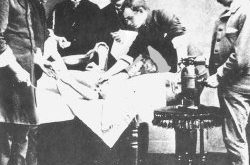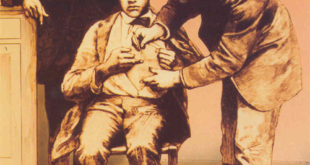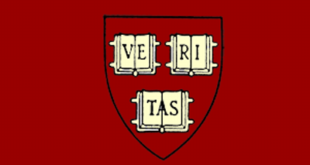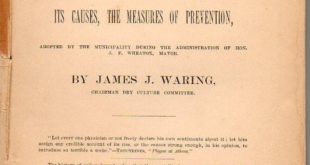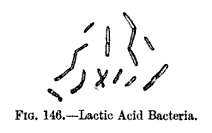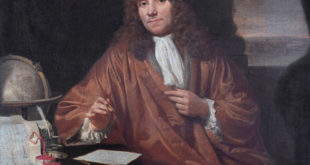This article was originally published on February 25, 2008 and has been reproduced here with the permission of the Answers Research Journal. Abstract “There is no remembrance of men of old, and even those who are yet to come will not be remembered by those who follow.” Ecclesiastes 1:11 (NIV) In past years revisionist historians have been rewriting the worldview …
Read More »Germ Theory of Disease
Louis Pasteur Changed Medicine, but was Not a Physician
By 1877 Louis Pasteur was coming to realize that he could no longer stand by and make scientific arguments regarding the research conducted on infectious disease. As a scientist he himself had to demonstrate the pathogenic role of the microbe through physical experimentation. Pasteur had so far proven that the absence of germs prevented disease (asepsis and antisepsis), but not …
Read More »On the Antiseptic Principle of the Practice of Surgery
Taken from the publication, “On the Antiseptic Principle of the Practice of Surgery.” The Harvard Classics.1909–14.” IN THE COURSE of an extended investigation into the nature of inflammation, and the healthy and morbid conditions of the blood in relation to it, I arrived several years ago at the conclusion that the essential cause of suppuration in wounds is decomposition brought …
Read More »The epidemic of Savannah
Originally published in “The epidemic of Savannah, 1876: its causes the measures of prevention, adopted by the municipality during the administration of Hon. J. F. Wheaton, Mayor” in 1879 BACTERIUM LINEOLA VIBRIO LINEOLA OF EHRENBERG. Under this designation I understand those rod bacteria, which are similar in all regards to the B. termo, but are much larger, and not only …
Read More »Pasteur and Asiatic Cholera in Egypt
Originally published in the “Journal of the American Medical Association, Volume I.” FOREIGN CORRESPONDENCE. PARIS LETTER. Paris, August 8th, 1883. Of all the theories propounded at the Paris Academy of Medicine, I know of none more absurd than that enunciated by M. Decroix, a retired army veterinary surgeon, on the depopulation of France, and the degradation of the French nation. …
Read More »Lactic Acid-farming Species
Originally published in “Fermentation Organisms” by Albert Klöcker in 1903 Mention has been already made of the discovery of lactic acid bacteria by Pasteur, of their importance in distilleries, and of their recent introduction into the latter in the form of pure cultures. The first to isolate a pure lactic acid bacterium for the above purpose was, as has been …
Read More »Germs from Nowhere
Micro-organsims were first discovered about 250 years ago. Antonie van Leeuwenhoek (1632-1723), a Dutch civil servant, learned how to make excellent lenses from which he also built some of the earliest microscopes. Leeuwenhoek used his microscope to look at lots of different things, including drops of water. When he looked at water drops magnified many times, he saw bacteria swimming …
Read More »Dr. Valentine Mott Has Taken Lessons of Pasteur
Among the arrivals from Europe by the steamship Etruria yesterday was Dr. Valentine Mott, who spent a week or more with M. Pasteur. Dr. Mott brought with him a memento of his visit to the Paris physician in the shape of a rabbit which was inoculated with rabies virus on the day he left Paris. He was too tired yesterday …
Read More »Indian Snake Bites and Pasteur
From The Westminster Gazette The next field in which M. Pasteur and his disciples hope to achieve great results is that covered by snake bites in India. Prof. Percy Frankland, in his address on Pasteur’s work to the British Association yesterday, referred to this subject as follows: “The possibilities of securing protection by means of the serum of immunized animals …
Read More »Transcript of a Discussion Regarding the Implementation of Pasteur’s Cure for Hydrophobia in Britain
PUBLIC HEALTH—M. PASTEUR’S TREATMENT OF HYDROPHOBIA.HC Deb 11 March 1886 vol 303 cc435-6 435 SIR HENRY ROSCOE (Manchester, S.): Asked the President of the Local Government Board, Whether, in view of the success said to have attended Pasteur’s treatment for hydrophobia by inoculation, he will consider the propriety of appointing a Committee, consisting of about six persons eminent in medicine …
Read More » Pasteur Brewing Louis Pasteur – Science, Health, and Brewing
Pasteur Brewing Louis Pasteur – Science, Health, and Brewing 